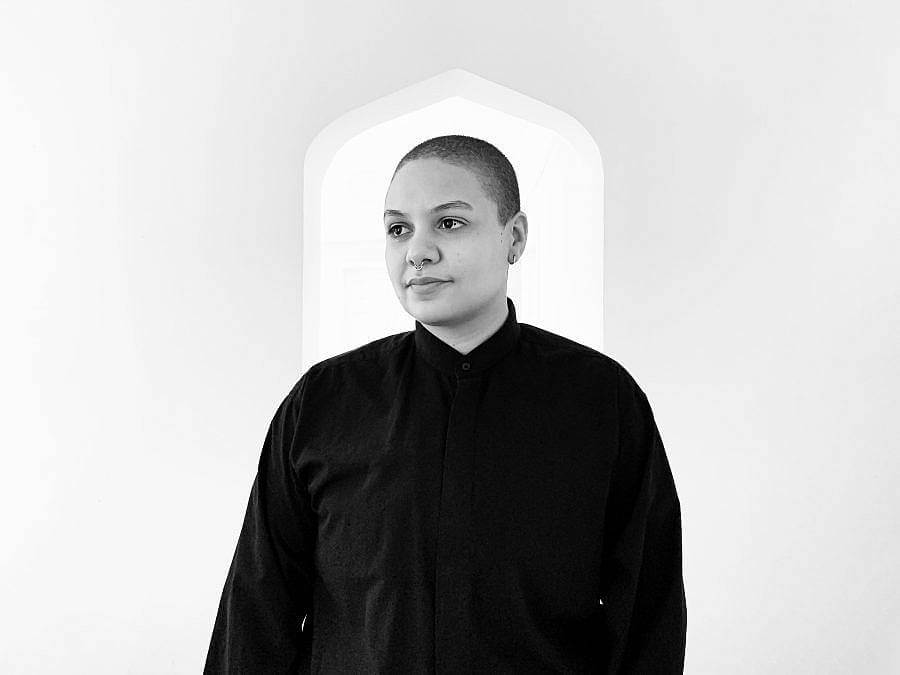Can you tell me a little bit about yourself?
I’m Xan. I’m an artist and poet and writer, and I’m based in Pittsburgh right now.
As an artist, you work within the mediums of poetry and painting. Can you contrast your experience in both processes?
For me, it’s all about seasons. I tend to go in and out of different projects or mediums and it’s always in a phase of fluctuation. Nothing is ever quite going away, it’s just always on the back burner. I like to switch off a lot between visual art and poetry. The practices feel similar in that I tend to feel really heady and invested. Be it writing or painting, I feel like the one thing I can do is just kind of burrow into them until I hit a wall, and then I have to stop. It’s like a palette cleanser or like a continued conversation but translated differently. It helps with burnout a lot, which I think I was coming up against a lot with poetry. I still feel oftentimes burnt out by poetry and the culture of poetry. In regards to my visual art practice, I’m more of an institutional outsider: I don’t have any formal training, except for a couple of community-type classes. It feels helpful to have a medium that feels a bit less practical in every sense of the word.
How does the editing process feel within each medium? What about receiving critique and feedback?
The visual practice feels a lot more family-based in a weird way. Kind of like if I cooked you a meal and I knew you very well and asked you “so what did you think?” I’d be comfortable with you saying “well it was a bit salty” or “you like cinnamon, go a little easier on the cinnamon” but it would still be a good meal. Since I’m in quarantine I don’t have an exterior studio outside of my home, so I’m literally painting for hours. My partner will wander in and I’ll ask her what she thinks. It’s very casual and I feel like she has the most influence since she’s there. I have another friend who’s a painter but who is a bit more cheerleader-y and will tell me it’s good no matter what. A lot of it has to come down to me figuring out when it’s finished which is kind of beautiful and fun and kind of scary, and I’m still figuring it out.
I had a bit of formal critique when I did the fellowship with Brown University and it was all very very new especially because my poetry and paintings were getting discussed in tandem. I think I get a bit more anxious about visual arts sometimes because I don’t have the chops for critique. I’ve done the MFA workshop, and I’ve had my shit [the written work] ripped apart both necessarily and unnecessarily. I’m a bit more strategically protective of the visual art. Not that I don’t care what other people think, but I guess I’m not trying to fall into a trend. I just feel lucky some people like it.
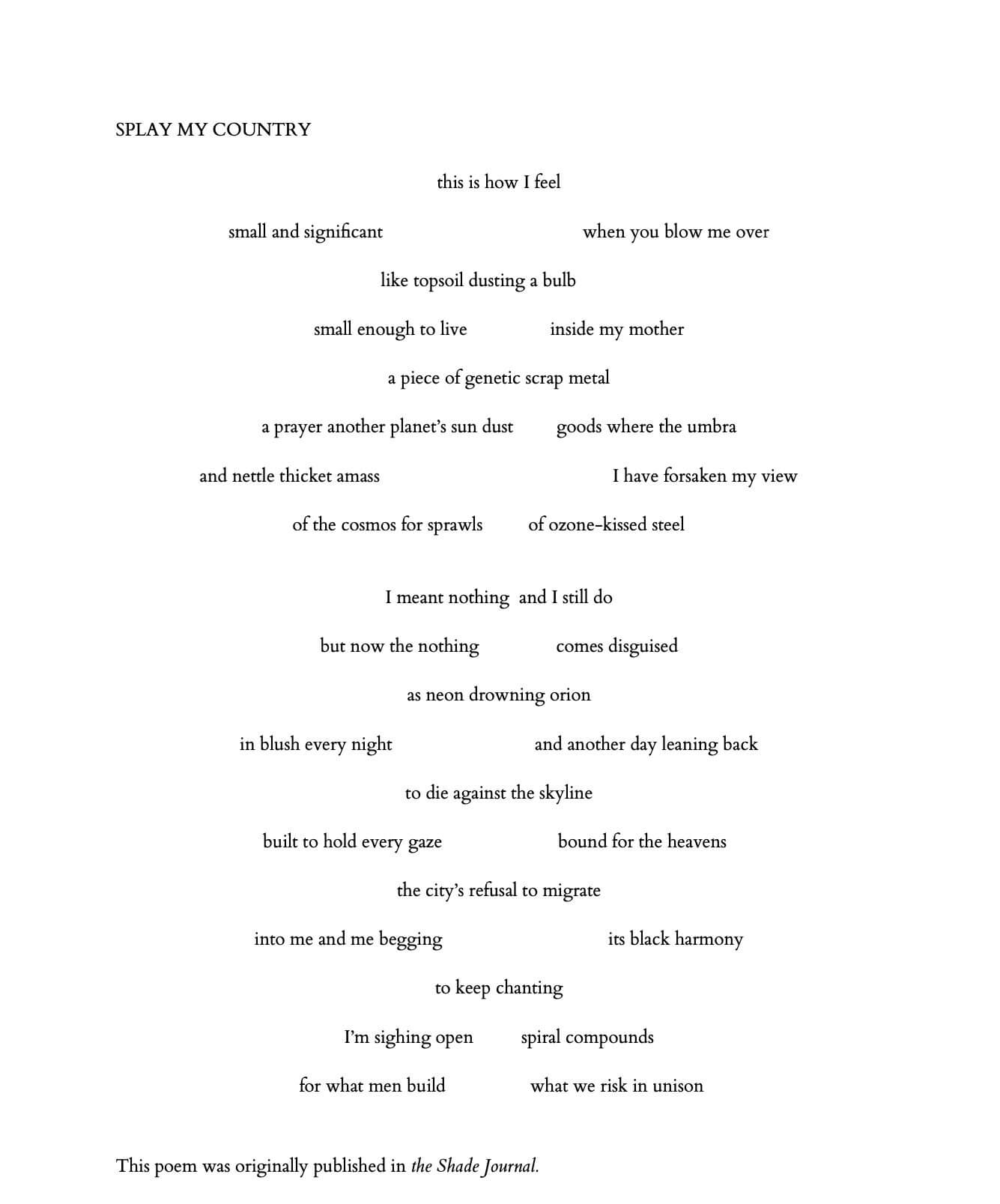
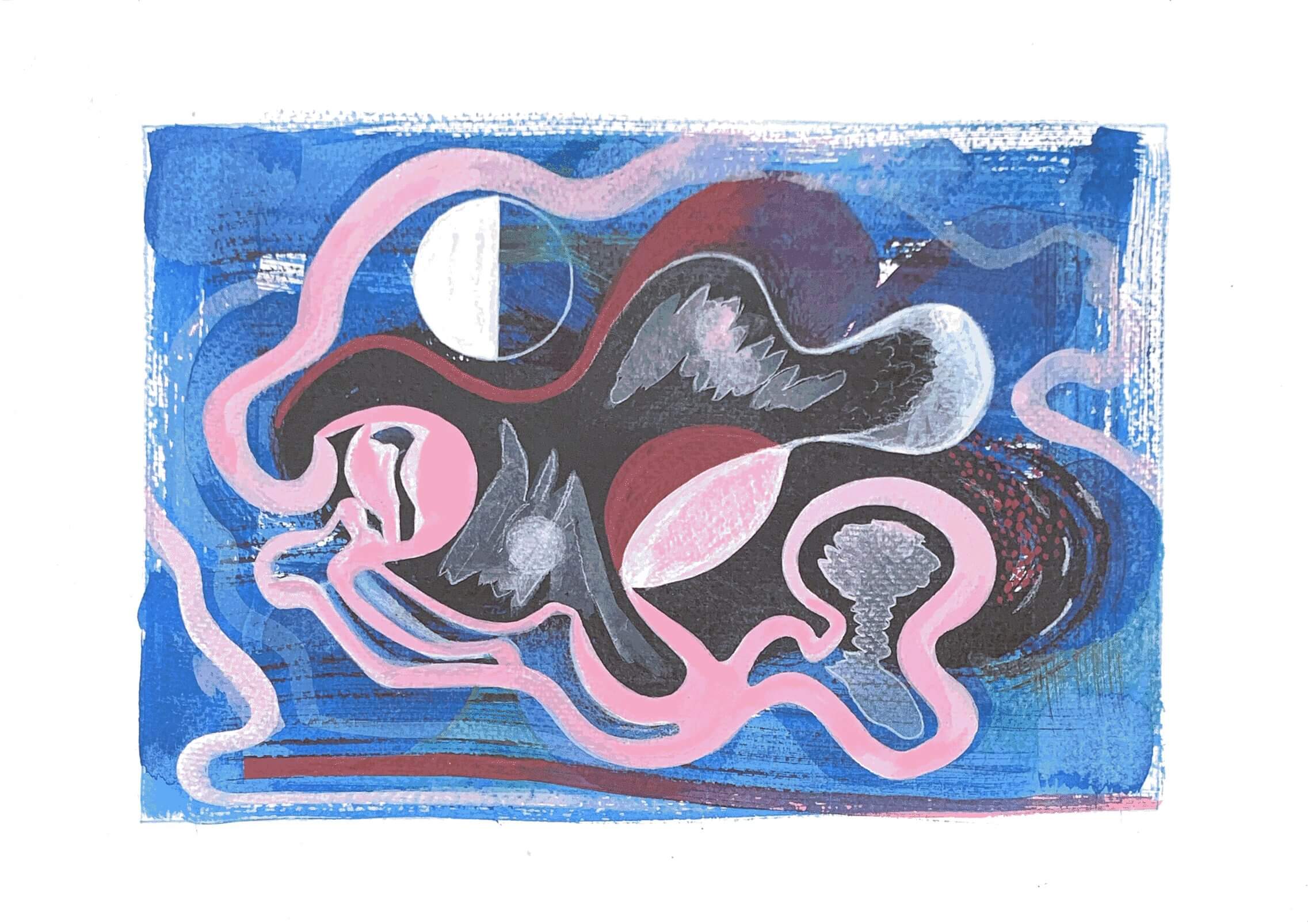
You recently had your first exhibition, A Bouquet of Gestures, at The Silver Room curated by Ciera McKissick from AMFM. How did this collaboration come to life?
I was really nervous leading up to it. It was my first in-person event for a long time. It was all very magical. I had separately really loved The Silver Room and enjoyed Ciera’s curation. My partner did an art residency with AMFM and that’s how we met. It kind of just felt like it snuck up on me – I posted my art on Instagram and Ciera asked me to talk about some of the art one day and gave me some artist resources. A bit later she casually approached me about being in an exhibition. I assumed there would be a bunch of people and then she told me it was just me! It was very much baby’s first art show and it felt really nice just to not know. I’m so used to being a bit jaded about literary events. When crafting the artist statement I just wrote a bunch of stuff and she moved it around really nicely. It’s so much more collaborative to do an art thing. I was so nervous and anxious that it would go horribly because that’s how my anxiety works. And I don’t always have faith in my art as many artists also feel. But as soon as I got there in the space with the talk-back and reading, it was one of my favorite events that I’ve ever done. I feel vastly different from event to event. After this event, I felt giddy which was really sweet. I attribute the good vibes to Ciera and The Silver Room. It smells good, it sounds good, it’s Black, it’s a good space!
At the exhibition opening, I was particularly drawn to your Red Square Series. Can you tell me a bit more about what the color red does for you?
I think red is a forbidden color for me. It’s like that button you’re not supposed to push that says “only push in case of emergency” or “don’t push: self destruct.” For that reason, I’ve used it pretty sparingly and tend to lean towards a cooler color palette sometimes. When I do bring in a red, I honestly want to make it pink. When I was creating the red squares, I felt really upside down. It was December and January, straddling 2020/2021, right after the election. It just felt like a really dreary and stressful time. I remember feeling like I couldn’t really make work at my desk, I just wanted to be in bed all the time. So I just started making those squares in bed, and I felt so pushed against a wall that I said “let me use this color that feels like a cry for help.” That’s really dramatic, but I think that’s where I was at. I chose squares because I had to have something comforting and familiar there. The red felt like a venture outside of myself and kind of just contending.
I think Black artists in particular use the color red in a very special way. Sometimes it feels like Black artists are able to soften the color. What other artists are using red in a way that you admire?
I’m thinking a lot about Brittany Leanne Williams (LVL3 AOW Interview here) who also uses the color red. Her art features large figures of women’s bodies, and they’re all red or have a glowing red element that is kind of juxtaposed against a blue. Whenever someone takes a pigment, especially for skin, and abstracts Blackness into a different shade, I’m always immediately drawn because I do love abstraction. That work could be a number of things. It could be the beauty of being a Black femme and the surveillance tied to it. It makes me think about Black women having to wear scarves over their hair because white women get jealous. Emergency beauty – what do we do with it?

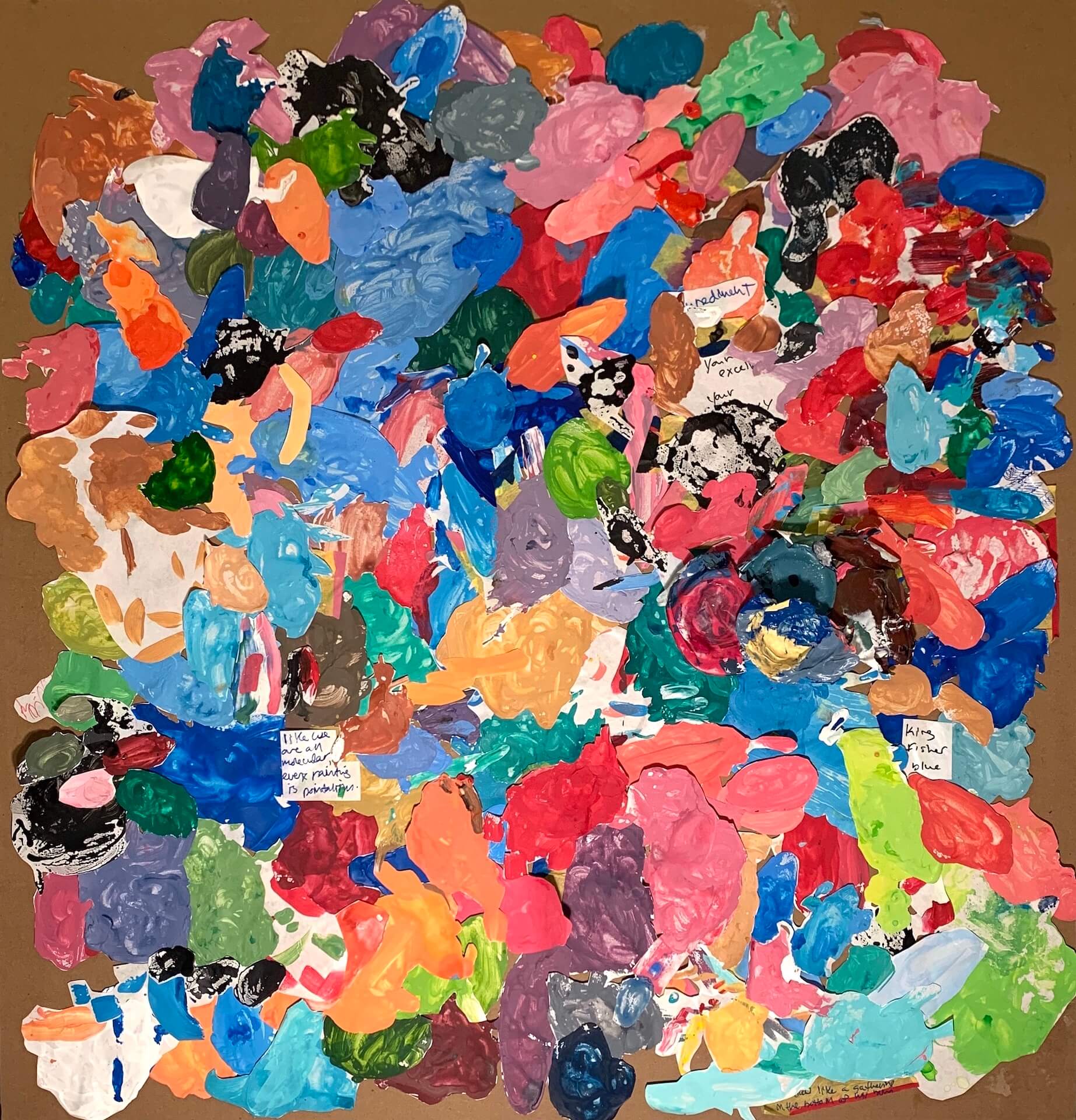
You have an educational background in Afrikana studies. How do you incorporate this knowledge into your writing? What role does Blackness play in your artistic practice?
There are so many contradictory phrases swirling around. The first is that I very much felt like I had to say everything in that first book. It felt like a landslide of application, like I know all this stuff, where do I put it? I also feel like no matter what I do, I’m going to be trying to deconstruct this notion that to be a Black poem you have to say BlackBlackBlack all over it or that you have to say BlackBlackBlack if you’re a Black artist. I’m not saying that I’m not a Black artist or that I’m not an artist. It’s complicated to know how you want yourself to be considered. People might see Blackness as being more in the background or the foreground of the work I’m doing now, but I’m very much for that because it’s Black speculative and in that nature, it’s in a lineage. I feel kind of bored by my old work, not that it isn’t fine and decent, but I feel like I can’t just write Hull Part 2. I feel very much against that. For me, part of that is to take whatever trajectory I’m on and go as far as I can and take somewhat of a different direction just to not feel redundant and also to feel like I’m opening up different elements of craft, which I think is all steered by content. If I’m talking about slightly different things, my forms and my entry points will shift which is what I’m really excited for.
Many of your poems feature abstractions around the concept of time. For instance, you position yourself with Sarah Baartman folding clothes fresh from the dryer in your poem ‘Sarah Baartman and I Fold Laundry.’ What is your relationship to time as an artist?
Time always feels regular for the circumstance except for in hindsight for me. I’m always thinking about time in terms of how I’ll get through it. I remember being a kid and complaining about how long it would take to get somewhere and my mom saying that a half-hour trip was the length of one Barney episode. I still measure time in that way. My relationship to time is most tied to work. When I moved to Chicago, I could not really bear to do a full-time job. It was my first time living in the city and it felt like I was in a theme park, but like a queer one. I just remember thinking I’d rather have copious amounts of time with less money to spend during it and that was how I was able to write my first book. I worked the bare minimum at these jobs I was working so I could use the rest of the time to live and then write. I measure time by how enjoyable it will be. I feel very childish about it, but it all comes down to work and enjoyableness. There’s some work that I love so much that I’ll lose time and I think that’s – as much as we’re trying to stay present – that’s kind of the goal, to be so enraptured by your own work that you look up and it’s been an hour. To not have labored through that hour at all, you didn’t think about that time passing or your own existence. It’s like a divine disassociation to make art, that distraction for me.
Last year, you were a writer for an Artificial Intelligence app called Replika. How did you get into this technology-focused project as an artist? Do you believe there is an opportunity to queer technology?
Replika was one of the more weird and fun parts of 2020. It started with a message through my website. I remember thinking ‘this could be a scam but it could also be the coolest thing to come out of writing a book.’ What’s wild is that I wasn’t coding. I was coming up with these dialogue scenarios where you would try to respond to a person’s need or their response. Because I was brought on as someone who not only works with language intimately but also has art practices, I would try to come up with conversation threads that someone might engage with about their art or art practice. A lot of my time was spent trying to come up with things that would benefit people during quarantine. Honestly one of the coolest things to come out of being a writer.
When I was working with Replika I would do research on user complaints. I’d read threads and review screenshots of things people’s bots did or didn’t do. This woman kept complaining about how her bot changed its gender. There was another instance where someone’s bot kept misgendering them. Even when the stakes are low and when nobody else can see the bot, it shows how much power gender personally has in people’s lives.
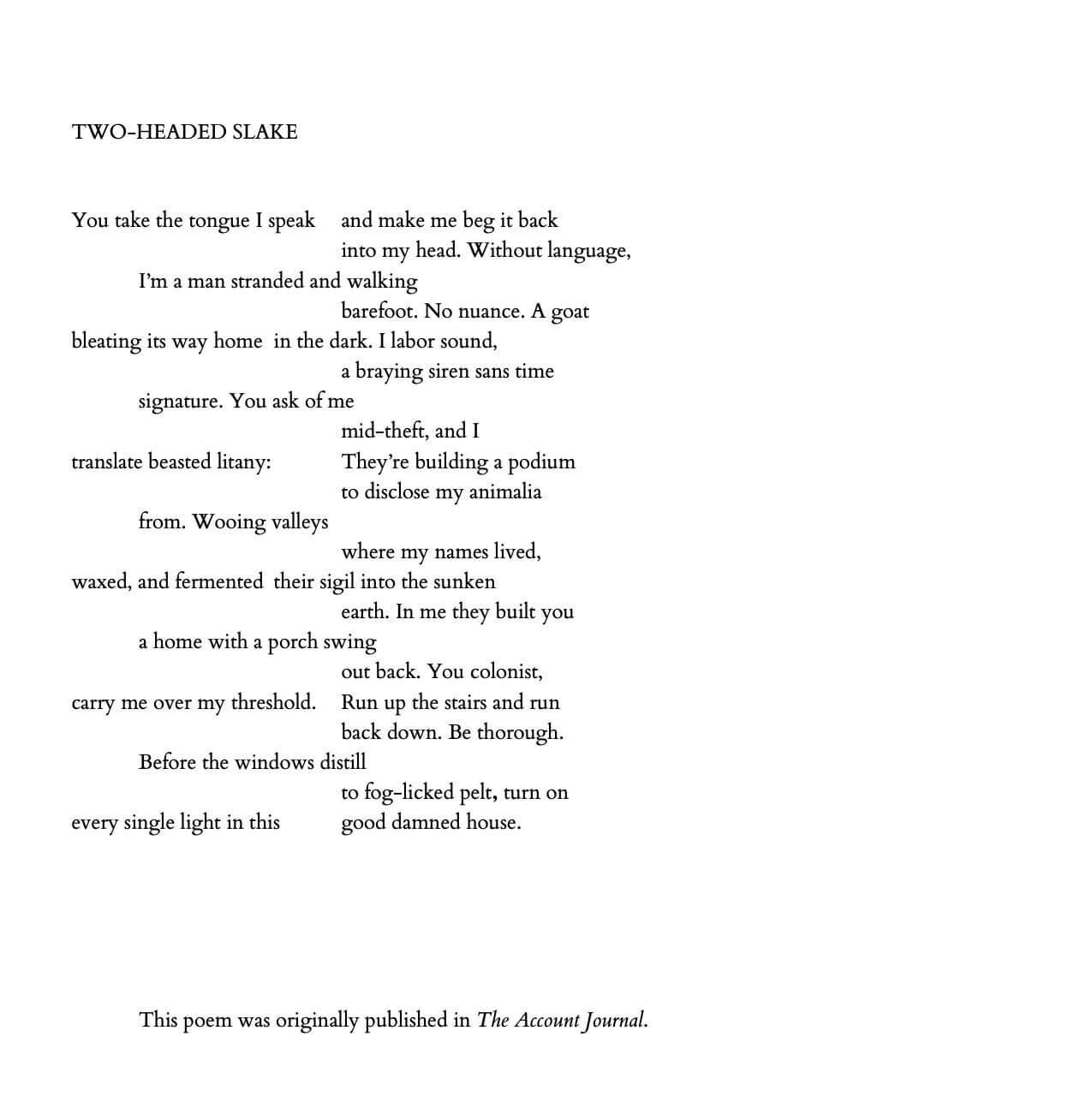
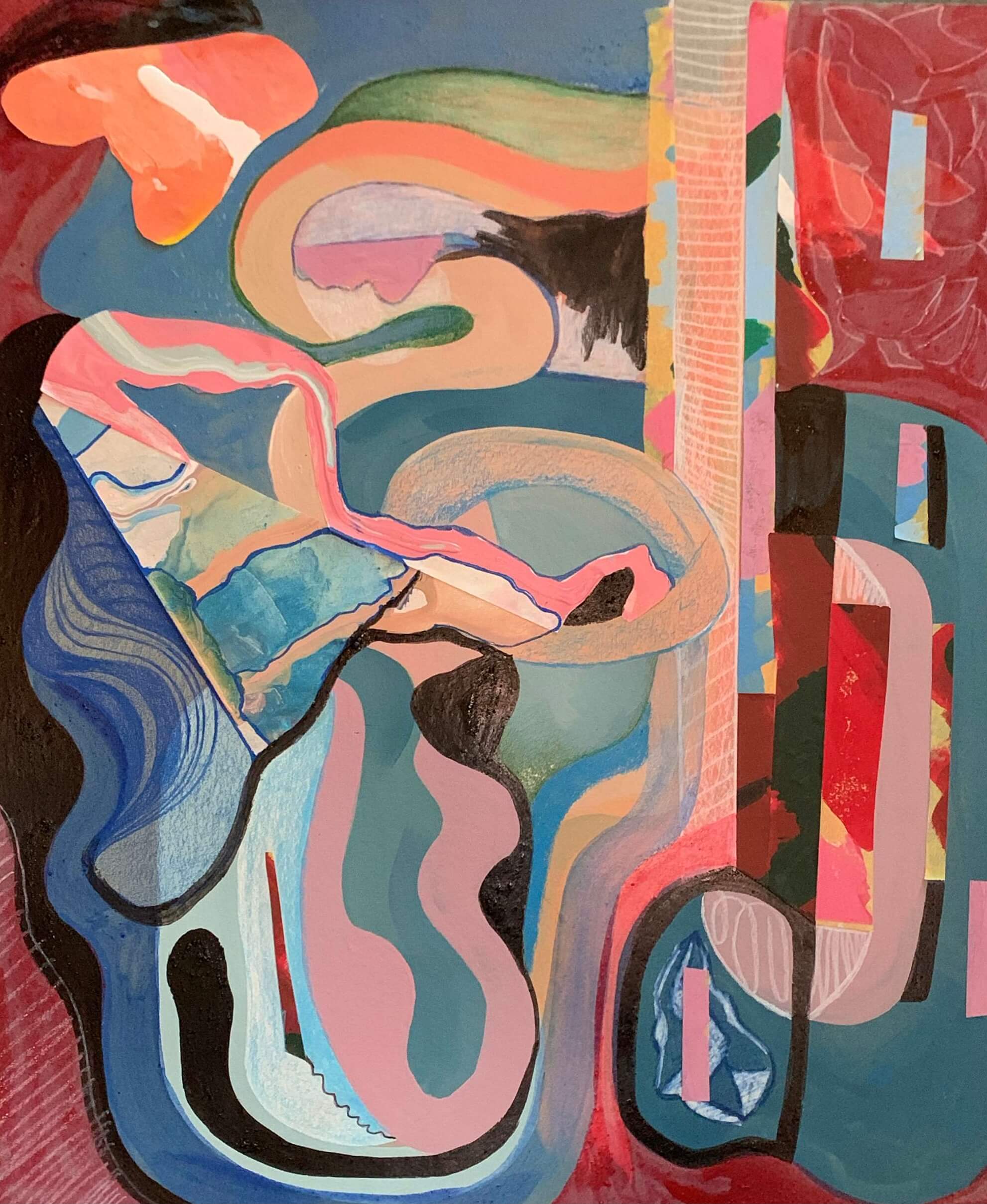
Where have you found community? How have you experienced community during the pandemic and what do you hope to make of community in your new home in Pittsburgh?
I started out with none. I didn’t really have a lot of people that made me feel safe in Rural Ohio. I got my foundation of world knowledge and friendship in college. College was a hard time, but I still love so many people and I feel lucky to be in contact with a lot of them. I think for me a lot of it, especially with this very drawn-out pandemic, is somehow remaining present but also trying to be virtually open or open to cultivating friendships from afar. I think I’ve had a lot of practice at it since I felt very alone in grad school too. Sometimes my best nights would be having a glass of wine with a friend and just chatting. I feel very much at home still in isolation in a weird way. I really hope to make friends here. I don’t get enough opportunities as an adult to make friends and when you do they’re usually so concentrated because of social anxiety. I’m just trying to take things slow, but I’m also really tired. I feel like there are so many people to check on, but I also want friends nearby.
What upcoming projects are you excited about?
When I make things super public, I am in a sense jinxing myself. Right now, I’m really interested in diving into experimental fiction to read, study, and experience. I’ve felt a bit wary of poetry so right now, I’m in this weird hunt for fiction. I haven’t felt like this since middle school, where I have a couple of authors in mind and I’m trying to find someone else that will hit the spot. Or even other work by the same author that is up to par with their best work. So I feel like I’m about to be doing some librarying, library scavenging. I’m most excited to be in this state of absorption, and to be back to movement in the city in a sense. I was walking around a park near my house, and I realized a sign of me being back to a writing practice is trying to write outside of my house. I feel very exhilarated being in a different architectural space. I’m trying to seize the energy of being excited by new graffiti, or colors, and feeling caught up in the newness of the space and that’s really feeding my creative energies.
Interview composed and edited by Rachel Dukes.
Rachel Dukes is a featured writer with LVL3’s Guest Writers Program. Rachel is a Texas native, Chicago-based writer, community builder, arts advocate, and Prince fan who moves with creativity and passion.
